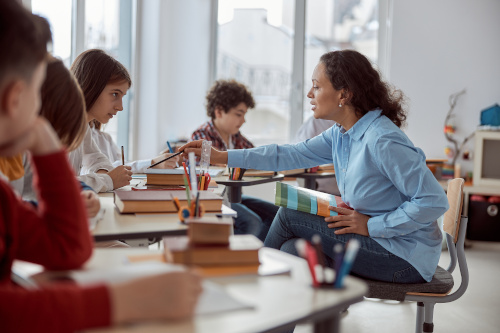In order for students to actually learn, they need to feel engaged on a cognitive and emotional level. They also need to feel safe.
Take a minute and think about that: students need to feel safe.
The first step in students feeling safe in school is having a positive relationship with the adult who is leading their educational journey. As Rita Pearson details in her famous TED Talk, every child deserves a champion or an adult who can make them feel safe and insist on them being the best they can be.
Relationships with students matter
Recently, I asked my friends on social media to share their stories of teacher champions. Here are two of the responses I received:
My 2nd grade teacher, Mrs. Miller, was my teacher champion! I entered 2nd grade not liking to read, and not really connecting with any of my former teachers. I remember walking into Mrs. Miller’s room feeling like the most important person. She always greeted me with a smile and had conversations with me about my life. She instilled my love for reading and love for school in general. I wanted to be just like her, and I knew I wanted to be a teacher from that moment. She is currently in her final year of teaching, and she is a cancer survivor. We are still in touch to this day
My champion is Mr. Hesling, my high school physics teacher. My parents were going through a divorce, which devastated me. Mr. Hesling knew what I needed without telling me he knew about my home life. I was noticed. I was important. I was safe in 4th hour.
Now, think about an educator who made a difference in your life growing up. What impact did this educator have? Why did they have that impact?
It’s likely because they took time to really get to know you, understand what you needed, and advocated for you.
Building strong relationships with students and having a meaningful impact on their lives matter. Doing so, however, takes time, attention, and some skills.
Building Deep Connections with Students
Creating lasting relationships with your students is all about building trust and getting to know them on a deeper level.
Related:
How I build relationships with students using instructional audio
5 ways relationship mapping supports your students
Students know all about their lives and what they like and dislike, so ASK them about it all. This can be done by giving them a student interest survey where they can tell you about their interests, passions, frustrations, and challenges. In addition to using this tool at the beginning of the year, try giving it to them a few times throughout the school year and notice how they change (…you can also give this to your colleagues to learn more about them, too!)
You can also ask other questions to build trust with students as you work to create an environment where they feel safe to learn:
- What are your hopes and dreams?
- If you could have a superpower, what would it be?
- Where do you learn best?
- What helps you focus?
- What should you avoid when you are trying to learn?
In addition to sharing their responses with you, encourage them to share their thoughts with their classmates. And, try using this information to create a culture and environment centered on learning – this could include putting their ideas on posters and hanging them up in the classroom or creating other visual safe spaces for students to learn and grow.
In addition to students’ responses to questions, student data provides valuable insights into students’ strengths and areas in need of improvement. Using such data, which can be gathered from an adaptive assessment, for example, can help you better understand where students are across subject areas and with grade-level standards so you can personalize your instruction more effectively and keep students more engaged.
Taking the time to know students deeply and connect with them frequently will help create the right environment for learning to occur and for students to engage emotionally and cognitively. In turn, this will help students feel safe to really grow and thrive. And, that’s why we are all so passionate about education, right?
- 3 ways to avoid summer learning loss - April 19, 2024
- High school students say AI will change the workforce - April 18, 2024
- Motivating students using the Self-Determination Theory - April 17, 2024


